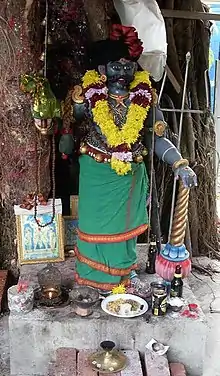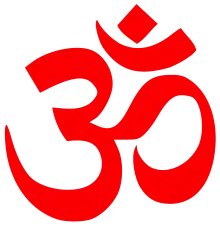Karuppu Sami
Karuppu Sami (கருப்பசாமி Karuppasāmi) is one of the regional Tamil Hindu male deities popular among the rural social groups of Tamil Nadu and parts of Kerala (Sabarimalai, Achenkovil and small shrines). He is one of the 21 associated folk-deities of Ayyanar and is hence one among the demi gods or Kaval Deivams of the Tamil heritage. He was believed to come from the Kerala region (Erumeli) as an assistant to Ayyanar during the Sangam Age. He was a local hero and then after his passing, the locals eventually worshipped his spirit (a Dravidian practice) and he was elevated as a "kaval deivam", just like Ayyanar was.
| Karuppu Swamy | |
|---|---|
Justice, Guardian, Protection | |
 Karuppannan | |
| Affiliation | Folk warrior hero from Sangam Era (Chera Naattu) |
| Abode | Sabarimala, Kallazhagar temple |
| Weapon | Aruval, Spear, Gada, Chain |
| Mount | Horse |
Temples and shrines
Karuppu Sami temple is mostly found in the outskirts of the Village. Usually, the whole village contributes to the maintenance of the temple. These temples/shrines do not have traditional Gopurams and have large statues of Gods with large eyes, holding weapons like bow and arrow, swords, sickle and other weapons. There could also be statues of 7 Kannimaar goddesses/Saptha Kanniyar (7 virgins) and animals, often a hunting dog, a lion and horse alongside the main idol of Karuppusami.
Worship
Karuppanar worship is a very ancient ancestral clan-based worship system. Most officiating priests are non-Brahmins and derive from local lineages that had initiated the cult generations ago. The worship pattern is non-Vedic or non-Agamic through folk tales, songs and arts (Villu pattu, Karakattam, Koothu etc.). The local priest might offer flowers or vibuthi (holy ash) to the worshippers and may play the role of an oracle for Shamanism. Various persons within the clan system are identified to play to the role of oracle on annual turn basis. They undertake vradham and maintain chastity and purity during the period. During the festivals, oracles get into trance state (Saami aadudhal) and deliver counselling messages to the group assembled there without bias. Before the oracles deliver counselling messages, oracles stand on top the aruval (aruval Mel vakku). The normal problems addressed are family problems, financial troubles and local community and social issues for resolving within the community group with the agreement of local ancestral god through oracle. Whenever the wishes of the people are granted, they give their offerings to Him based on what they vowed to offer.
Karuppu Sami is also worshipped in Trinidad and Tobago, Guyana, Suriname, Guadeloupe, and Martinique under the name Dee Baba, Sangili Karuppan, or Sangani Baba. Offerings of cigarettes, camphor, biscuits, butter, cloves, ghee, and alcohol as well as a sacrifice of a black chicken or goat are made to him here.
There are 108 form of Karuppan. Here are the list of 21 Karuppu :
- Padinettam Padi Karuppan
- Sandana Karuppan
- Sangili Karuppan
- Ondi Karuppan
- Chinna Karuppan
- Periya Karuppan
- Vettai Karuppan
- Nondi Karuppan
- Sappani Karuppan
- Kottai Karuppan
- Veera Karuppan
- Masana Karuppan
- Kattu Karuppan
- Samaya Karuppan
- Agayam Karuppan
- Ellai Karuppan
- Muthu Karuppan
- Malai Karuppan
- Masi Karuppan
- Sonai Karuppan
- Maya Karuppan
- Ponthupuli Karuppan
Annual festivals
The village committee would decide on when the annual festival be conducted. The time of the year when this would fall varies with villages and their local customs - each of which will be associated a folk-lore. Generally, the mass convention assembly of a large number of related family members is organized during the spring season for a period of 2 to 3 days. The commencement of the festival will be with that of a hoisting of the flag and tying the "Kaappu". After this time, villagers cannot go out of the village but can come in from a different village. During this annual gathering, a large number of goats and chicken are sacrificed for Karuppanar. He is also offered Beedis (country made cigarettes) or cigars and Naravam or some form of modern alcohol.
